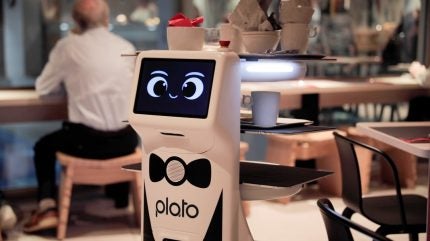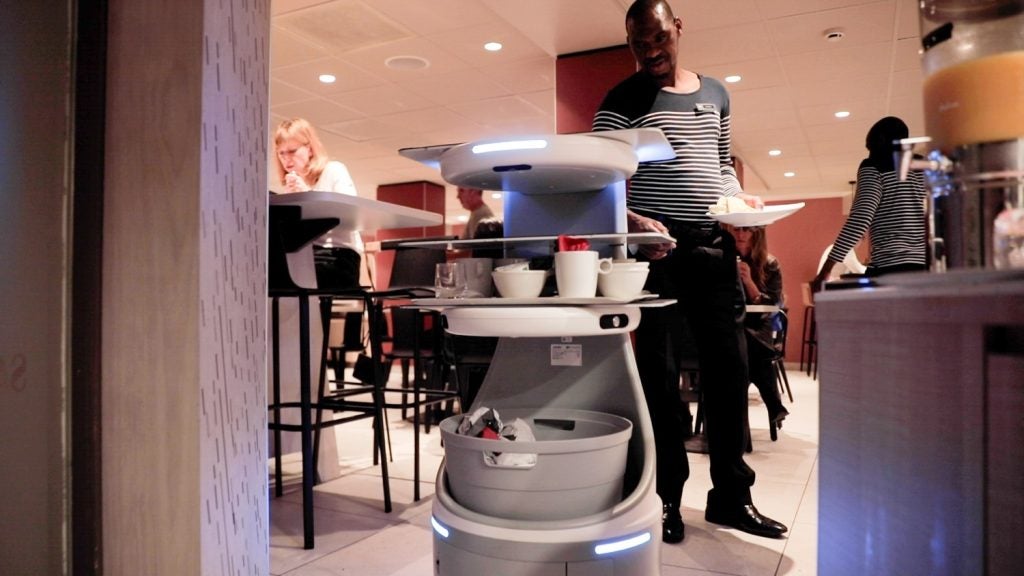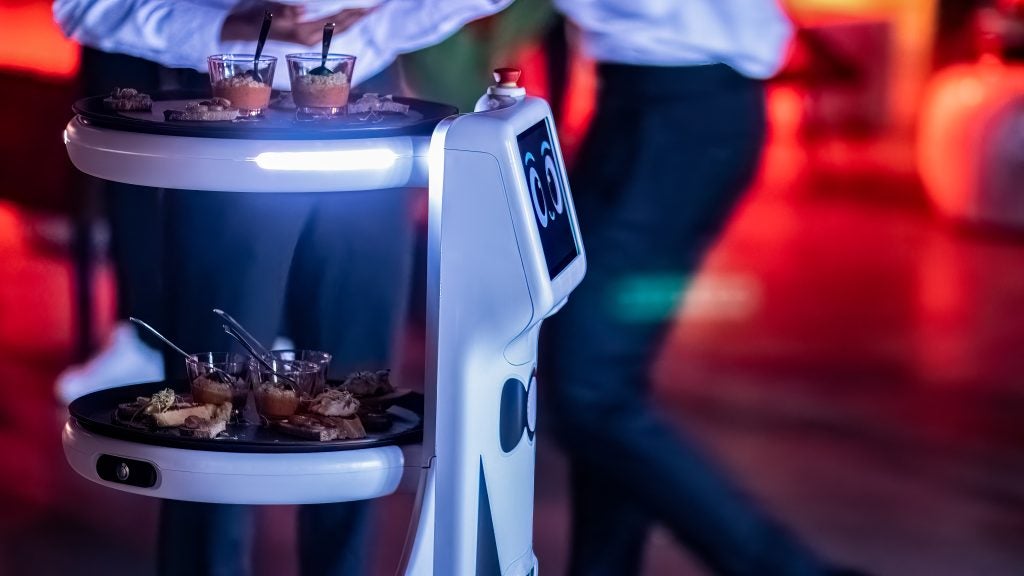
Once a staple only of scientific fiction, robots are increasingly becoming an essential solution for a range of industries, and hospitality will be the next to reap the benefits, according to United Robotics Group (URG), a provider of service robots for businesses.
Data collated by Hotrec revealed that, after the onset of the Covid-19 pandemic in 2022, there was a staffing gap of between 10% to 20% across hospitality in the EU compared to 2019 levels. That included 200,000 unfilled positions in hospitality in France, 250,000 in Italy and 33,000 in Austria. In the UK, there was a shortfall of around 174,000, with an estimated revenue loss of €21bn ($23bn).

Discover B2B Marketing That Performs
Combine business intelligence and editorial excellence to reach engaged professionals across 36 leading media platforms.
It remains a problem across Europe, and it’s putting pressure on an industry keen to throw its doors open post-Covid.
Anis Ben Mahmoud, hospitality and retail business development director at URG believes that the answer lies – at least partially – with robots.
Robots could plug hospitality’s talent gap
URG introduced its robot assistant Plato in 2022, designed specifically to ease staff shortages in the hospitality sector by taking over repetitive low-value tasks. According to Mahmoud, it’s about “making robots work hand in hand with humans to give people better working conditions.”
He identifies two key benefits to the introduction of robots in the hospitality sector: staff satisfaction and staff availability – both of which can be contributed to through the automation of repetitive and unpleasant tasks.

US Tariffs are shifting - will you react or anticipate?
Don’t let policy changes catch you off guard. Stay proactive with real-time data and expert analysis.
By GlobalData“Once you avoid painful tasks, there are fewer injuries, less sickness and better working conditions, so better retention,” Mahmoud tells Hotel Management Network. “You better handle the labour shortage and you create a kind of virtuous cycle. You give staff a tool that is going to help them to do their job better and focus on where they prefer to focus, especially in hospitality. It’s about taking care of people.
“When you have Plato doing the back and forth, you save time, and then it is about what you do with the time that you save. Imagine you save a restaurant waiter from doing all the back and forth; they can stay closer to the guests and be more present.
“By saving time and by removing painful, repetitive tasks from staff, you change the work, and you enhance the customer experience.”
URG hopes that streamlining processes using robots will enable hospitality operations to run smoothly despite having fewer workers. Plato has been designed as a runner and can be used for some less complex and popular tasks.
Mahmoud suggests it can also assist in antisocial shifts, pointing to the example of Le Méridien Étoile, a 1,000-room hotel where the robots are used to aid breakfast service.
“Breakfast is the hardest shift for a hotel, because no one wants to start very early in the morning, and you spend most of your time cleaning the tables,” says Mahmoud. “It’s just about the churn rate, to make sure that anytime guests arrive, they find a table available.
“In this use case, the hotel has three Platos in three corners of the restaurant room. Staff clean the tables and put all the dirty dishes onto the Plato, then it is sent to the dishwashing station. Once the robot is empty, it returns automatically to its position. Each robot cruises for around one kilometre a day and carries an average of 306kg a day. That means that more than 900kgs of dirty dishes are carried daily by the three robots during the three- to four-hour breakfast.”

The response
There is a generally positive sentiment towards robotic technologies across most sectors, and GlobalData’s Q4 2023 Tech Sentiment Polls survey found that 72% of respondents believed that the technology “would live up to all of its promises”. Sentiment towards robotics was more positive than towards AI, cybersecurity or cloud computing.
Mahmoud has seen similar optimism from URG’s customers, explaining: “Customer responses are most of the time very positive because we are a European company and we are building European solutions for European needs.
“We want to keep the human contact, and, once we introduced Plato as a way to help staff and not replace them, it totally changed the perception of the customer.”
Considering Le Méridien Étoile, he recalled that “at the beginning, there was resistance. When you train any team, you have always around 10% or 20% of people saying, ‘No, never, I don’t want to use the solution.’ But our best ambassador today was our biggest detractor at the beginning.
“Often, we have the impression that we will be replaced by robots, and we don’t think about what we will do with the time that we’re going to save. We think about whether it is going to take our jobs, but we need humans, and we need them on the highest added value tasks.”
A versatile robot: other use cases for Plato
Considering Plato’s role in improving the customer experience, Mahmoud suggests that Plato’s potential uses extend beyond hotels, noting opportunities in transport, retail and healthcare.
“We have Plato in airport lounges, in order to enhance the passenger experience and to help the staff,” he says. “We have it in airports in Lyon and Nice in France, for example, and Plato is also in some restaurants and in training centres. We are expanding more and more use cases with hotels, restaurants, airports, and elderly care homes.
“We are expanding outside of the hospitality sector, but we are getting there through hospitality.”
These sectors are facing their own staffing challenges, with healthcare and social care in need of more skilled labour. The European Public Service Union (EPSU) reports an estimated one million vacancies for health workers in the EU, while the World Health Organisation (WHO) reported in September 2022 that health systems were threatened by a “ticking timebomb”, noting that 40% of medical doctors in a third of countries across the WHO European region were already aged 55 or over.
Mahmoud thinks robots could help to ease the pressure on hospitality staff, by taking some common worries away – both figuratively and literally.
“You cannot replace someone working in elderly care homes or hospitals as easily as you can for a hotel or restaurant, because you need skilled people,” he says. “However, the more you help medical staff, the better it is for the patients. In healthcare settings, Plato can be used for the delivery of meals, medication (depending on the country), and for the disposal of waste.”

Retail too, could see the introduction of robots such as Plato, to streamline processes and supercharge marketing. Plato is already in use at Red Bull stores in Germany, where the branded bot moves stores bi-weekly to promote products.
“It’s all about bringing the product off of the shelf and giving it more visibility,” explains Mahmoud. “Promotion is very important for all retailers, and they are asking for solutions. There are also heavy things to carry in retail, and Plato can do the back and forth from the storage to the front store in order to help the staff.”





